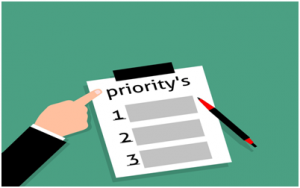
Counselling is an amazing process, where you can assess your feeling/situation and to try new ways of thinking and being. You might just be thinking about starting counselling or midway through a series of sessions. Here are some ideas about how you can make the most of counselling to help you change your situation.
P.L.A.N A.H.E.A.D
P- Prioritize counselling

Make counselling your priority by attending regularly and on time. Try not to skip sessions without a good or valid reason. If possible, make the most of the therapeutic ‘hour’ by arriving a few minutes before a session to mentally and emotionally prepare for the session.
Often, situations can get rough but if you want to make changes, it’s important to make counselling a priority in your life. If you find attending regularly difficult or notice you are constantly showing up ten minutes late maybe it’s time to ask yourself ‘WHY?’. Is the issue an emotional one – are you avoiding change? Or is it practical? For example, if finance or time is an issue you could always make an agreement with your counsellor to meet fortnightly instead of weekly.
L- List what goals you want to achieve in counselling

Clearly defined goals make counselling more effective and beneficial. If your goals are clearly defined, your counsellor is more likely to give you appropriate strategies to help you achieve your goals. If your goals are vague or undefined, progress is less likely. Try stating your goals in a sentence or phrase such as, “I want to overcome my anxiety” or “We want to improve our relationship.” A good counsellor will help you define your goals in clear and concise terms. You can help your counsellor help you by having a clear and concise idea of the goals you want to pursue in counselling.
A- Always be open and share what you are feeling
Be as open and vulnerable as you feel. At first, it might be difficult to trust your counsellor and be honest about what is going on with you or your relationship. It’s important to find a balance between feeling safe and pushing yourself to the edge of your comfort zone. If you are finding it difficult to open up, it might be useful, to be yourself, just say what you what to say and be at ease in front of the counsellor. Remember even though your counsellor has had extensive training they still can’t read your mind unless you open up.
N- New ideas and skills
Einstein’s definition of insanity is doing the same thing over and over and expecting different results. Clients in counselling who practice Einstein’s advice make progress by trying new ideas and skills that they and their counsellor suggest. Clients who are not open to trying new ideas and skills are less likely to make progress because counselling is for change. How can you change the situation, if you, yourself is not willing change?
A- Allow people in your support network

Clients who get support from others during the counselling process are most likely to make progress than those who attempt to ‘do it alone.’ Although it is still possible to make excellent progress without involving others in addressing your issues, it can be much easier when this support is present. Seeking support and assistance outside of sessions can often be helpful (although in some instances client’s attendance and engagement is equally beneficial).
H- Have realistic and positive expectations for counselling
Expectations lead to disappointments, but not in counselling. Your expectations play a critical role in the amount of progress you will make in counselling. Unrealistic or overly negative expectations make it less likely that progress will occur. A client who enters counselling with the pessimistic view that no progress is possible because they’ve supposedly tried every approach and “none of them works” will also make little progress because of the influence of their negative expectations. Having realistic and positive expectations regarding counselling often leads to progress. This involves also viewing progress in counselling as similar to progress in most other endeavors. That is, if you are prepared to work with your counsellor, to learn and apply skills, you are likely to see some progress early on in counselling and will likely see substantial progress over time if you continue to learn and apply these skills. Clients who have these realistic and positive expectations are more likely to be motivated to do the work necessary to make progress and therefore tend to be more successful in addressing their issues.
E- Experiment
It is not enough to simply talk about the changes you want. Most of the work happens outside of the therapy room where you apply what you learned in the sessions. Some
counsellors might ask you to do home tasks or you might want to set a mini-experiment for yourself. Applying things out in the ‘real world’ can help you see how these changes feel. If you normally come to counselling having planned what you wish to say, how does it feel to talk without a plan or vice versa? If you want to have a conversation with a difficult relative, you could try role-playing it with your counsellor.
